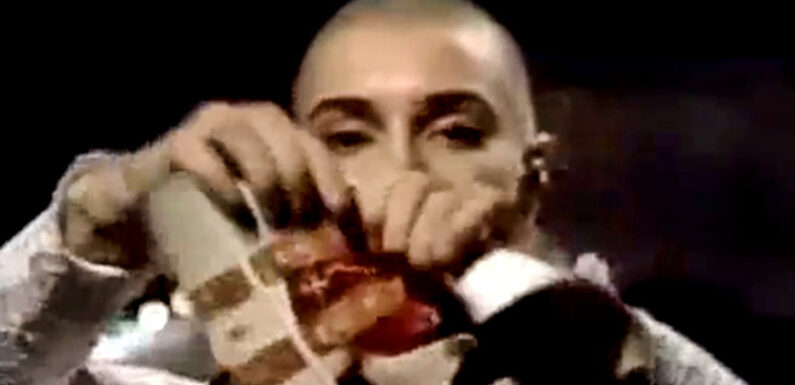
Save articles for later
Add articles to your saved list and come back to them any time.
What people remember about Sinead O’Connor’s October 3, 1992, appearance on Saturday Night Live is this: At the end of her second performance of the show, a cover of Bob Marley’s War, O’Connor intoned gravely, “We have confidence in the victory of good over evil.”
As she held tight to the word, stretching it like a castigation, she grabbed a photo of Pope John Paul II and held it up to camera. When she let the word go, she punctuated her exhale by tearing the photo three times, followed by an exhortation to “fight the real enemy”. She tossed the fragments to the ground, removed her in-ears, and stepped off the stage into culture-war infamy.
O’Connor tears up a picture of the pope during her performance in 1992.
Throughout her career, O’Connor – whose death, at 56, was announced on Wednesday – was a fervent moralist, an uncompromised voice of social progress and someone who found stardom, and its sandpapered and glossed boundaries, to be a kind of sickness.
She was also a singer of ferocious gifts, able to channel anxious passion with vivacious power and move through a lyric with nimble acuity. She was something grander than a simple pop star – she became a stand-in for a sociopolitical discomfort that was beginning to take hold in the early 1990s, a rejection of the enthusiastic sheen and power-at-all-costs culture of the 1980s.
And so, in an era where late-night television performances could still prompt monocultural mood shifts, her gesture was a volcanic eruption. She became a target instantly – of the religious right, of other celebrities, and, as she reported many years later in her memoir, of a couple of egg-tossing young men, as she exited the studio that same night.
But none of that extinguished the power of her protest. And she was a savvy radical – reportedly she had done something slightly different in rehearsal, and saved the pope photo for the actual show. (The photo itself had hung on the bedroom wall of O’Connor’s mother, who O’Connor later said had physically and sexually abused her as a child.)
Also, she was on live television, holding court for three minutes on the miseries of discrimination and abuses of power, under the guise of being a pop star performing a song. She was daring the cameras, and the viewers, to look away; no one did.
The recriminations O’Connor faced recall the bankrupt culture wars of a different era – she was “banned” from appearing on Saturday Night Live again, and the show mocked her on subsequent episodes.
The following week’s host, Joe Pesci, took direct aim at her. “I’ll tell you one thing: She’s very lucky it wasn’t my show. ’Cause if it was my show, I woulda gave her such a smack.” Cue laughing and clapping from the audience.
He continued, “I woulda grabbed her by her … eyebrows.” More laughter. At one point, he triumphantly held up the taped-together pope photo, like a feckless politician stirring up his base. (Tellingly, footage of Pesci’s monologue is available on the official YouTube channel of SNL; footage of O’Connor’s performance is not, though it can be found in various unofficial locations online.)
Of course, she was correct – the scale of sexual abuse perpetrated within the Catholic Church that came to light in later years was staggering. By then, O’Connor’s protest felt distant, but the damage it did to her career was permanent.
At the time, O’Connor was only a couple of years past her American breakthrough – her piercing cover of Nothing Compares 2 U, written by Prince (and originally performed by his side project the Family). Subsequent to SNL, she had a handful of hits, but mostly retreated from the pop spotlight.
Or maybe the way to think about it is that she right-sized her career, away from the silly and grim expectations of complaisance that come with universal acclaim and toward a more earnest plane.
Whichever the case, the pope brouhaha obscured something perhaps just as extraordinarily powerful – the song that O’Connor had been performing. Her War cover had lyrics slightly modified to allude to the abuses in the Catholic Church that she was protesting. (She also performed Success Has Made a Failure of Our Home that night.)
She’s performing War a cappella, staring hard at a camera off to her left. Less singing than declaiming, she renders the song with a forceful clarity, landing every line with nervy syllables held just a microsecond past comfort, as if reminding the viewer of the need to gulp them down whole.
Marley’s original – the lyrics are drawn from a speech given by Ethiopian Emperor Haile Selassie before the United Nations General Assembly in 1963 – moves with a sly breeze. O’Connor’s, with its silence, turns the original plaint into a jolt.
Her performance is anthemic, invigorating, a call to arms for the dispossessed and an elegant dissection of the authoritarian powers who hold them down. Her vocal is level and determined, but her howl is spiritual and undeniable:
Until the ignoble and unhappy regime
Which holds all of us through
Child abuse, yeah, child abuse, yeah,
Subhuman bondage has been toppled
Utterly destroyed
Everywhere is war
If there is a moment of true singing here, it’s right before the grand gesture at the end. “Childrennnn! Childrennnn!” O’Connor sweetly chants, calling everyone to attention. Then, with everyone’s ears perked, she nods her head forcefully and jabs out a quick, urgent instruction: “Fight.”
This article originally appeared in The New York Times.
Support is available from the National Sexual Assault, Domestic Family Violence Counselling Service at 1800RESPECT (1800 737 732).
Most Viewed in Culture
From our partners
Source: Read Full Article
